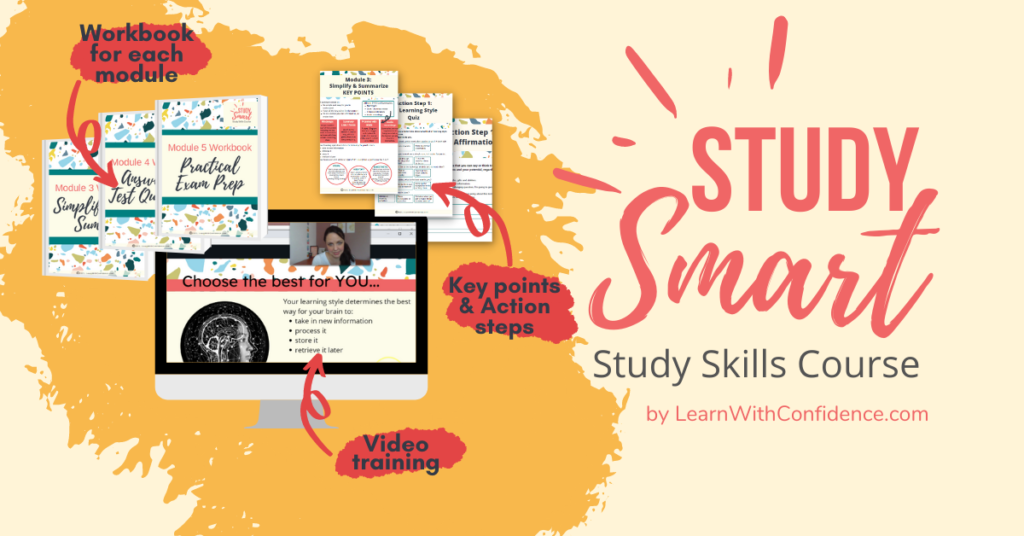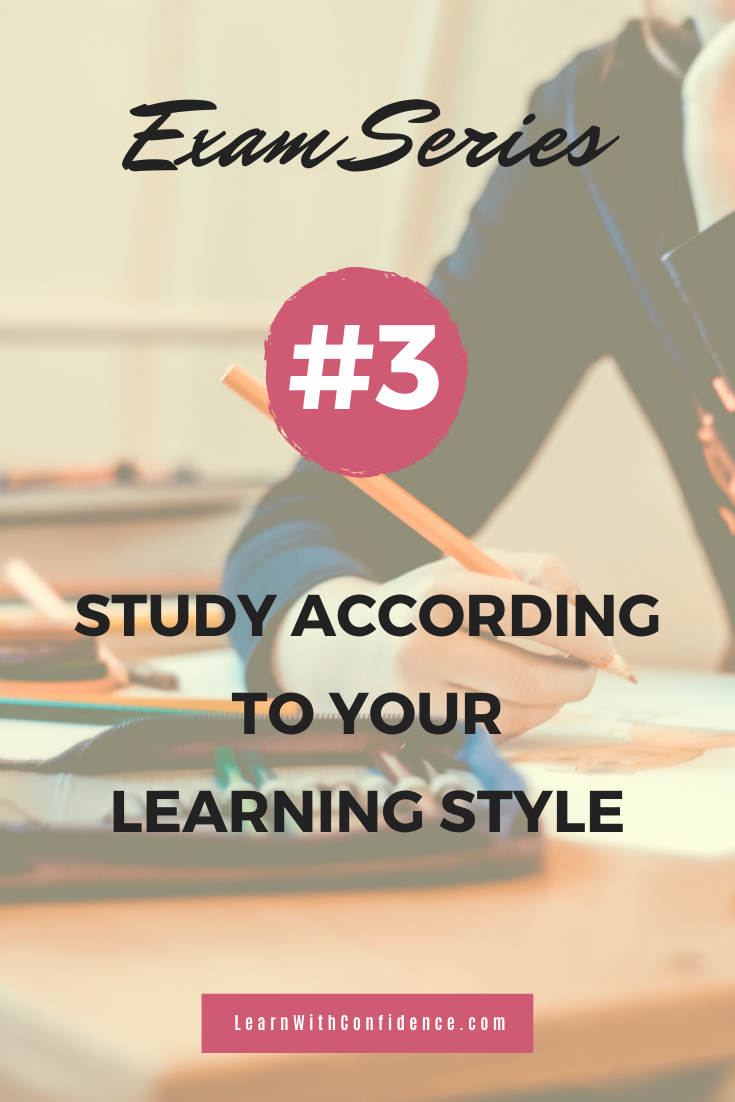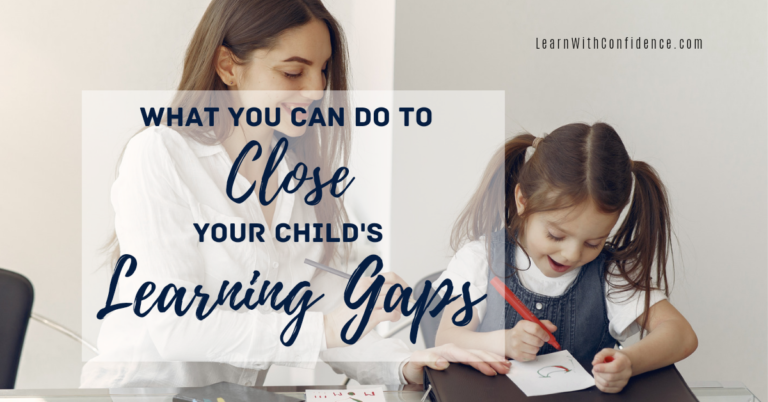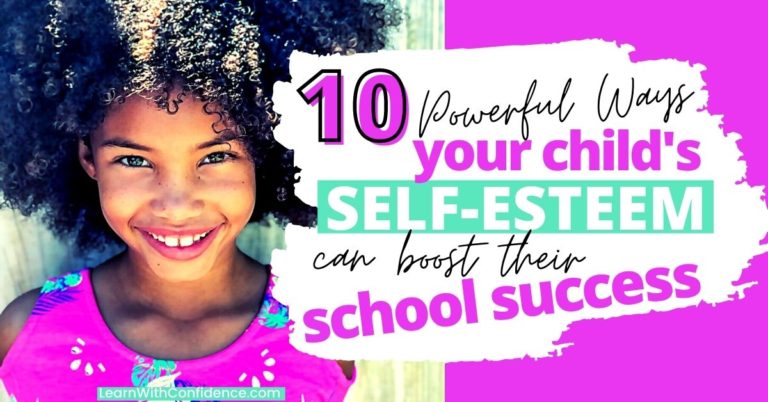5 Learning Skills your child needs to Make School Easier and More Successful
Want to make school easier for your child? Who wouldn’t! These 5 learning skills are used in ALL of your child’s school subjects. And developing, practicing and mastering them could be a major game changer to your child’s success in school.
All you want is for your child to excel.
You know they’re brilliant, you know they have potential, but they just can’t seem to achieve the results you know they’re capable of achieving. You don’t want to push too hard, but you also don’t want to sit back and settle for a less-than-stellar performance.
Children struggle in school for a number of reasons. Regardless of the reason, often academic performance takes a knock. Sometimes we think that if we help them with the school subject they’re struggling with, things will improve.
But the problem is often deeper than that. Getting to the core issue is more valuable because it can transform more than just your child’s understanding of a particular subject.
One of the most important reasons children struggle in school is that they need to improve their academic or learning skills that help them across the lines of content and subject.
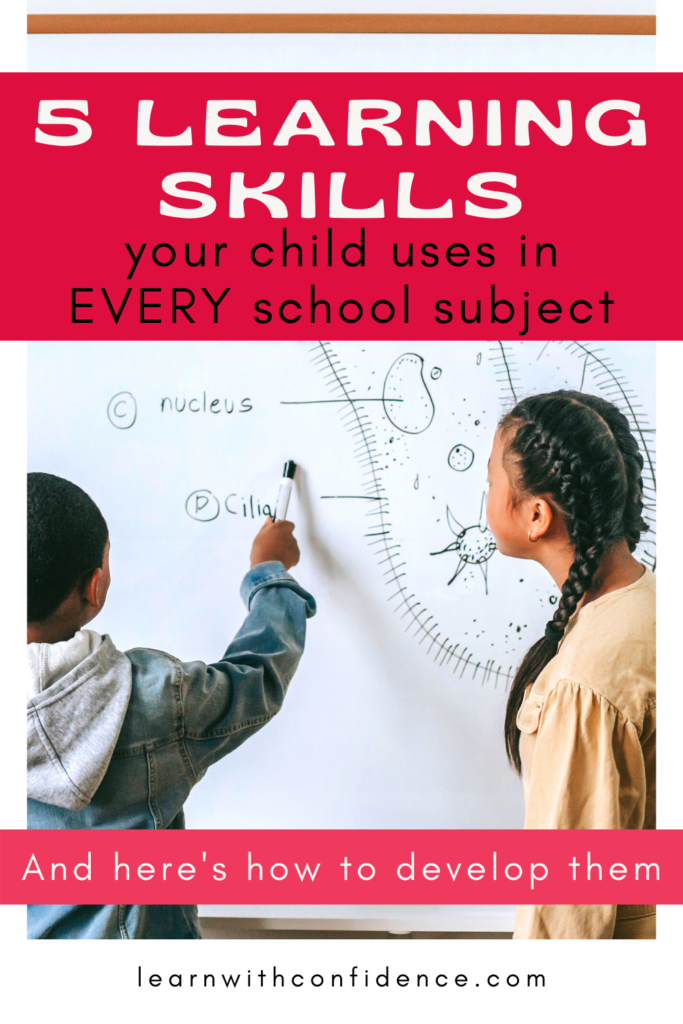
Learning skills affect all school subjects.
These skills we’re going to talk about are foundational to success in ALL of your child’s school subjects. If your child is struggling academically it might be the subject matter of the different subjects they’re struggling with, but more likely it’s a skill they haven’t yet mastered.
These skills are valuable because of how they train your child’s brain to think in a way that supports academic success.
5 Learning skills your child needs to make school easier and more successful.
There are 5 main skills your child needs, that are used across all subjects, that your child needs to make school easier and more successful.
1) Reading and comprehension
Reading is a complex skill. It always blows my mind how the first grade teachers teach children who can only just maybe identify their letters, to read sentences, and even whole books, by the end of the year!
The power of good reading skills
Making sure your child can read gives them the power to access all manner of information and gives them authority in their world. And obviously, in the school setting, reading information is something they’re going to do a whole lot.
Good reading skills can also help your child work more quickly because they aren’t spending so much time and energy on the actual act of reading the work. They can then get on with taking the action they need to.
Because more than simply just reading the words, your child needs to comprehend what they’re reading. Take it in, process it, remember it, make connections with it. And comprehension skills might be one of the most important skills your child will develop as they read.
Reading and comprehension skills for success in all subjects
They’re not just important for learning English or another language, but for all subjects. Not because of the skill of reading itself, but for the way your brain works when it comprehends and then uses that information.
For example, when your child reads a word problem in Maths, they are going to need to understand what is happening in the paragraph. Based on the information given to them they are going to make a decision about how to solve that problem mathematically. Or perhaps in Science, they may have to read the contents of an experiment they must perform. Developing good reading and comprehension skills will help them understand the task and perform it.
Reading can be used for developing a whole host of other skills too! For example, your child’s social and emotional skills. Grab this free resource, below, to help you get started.
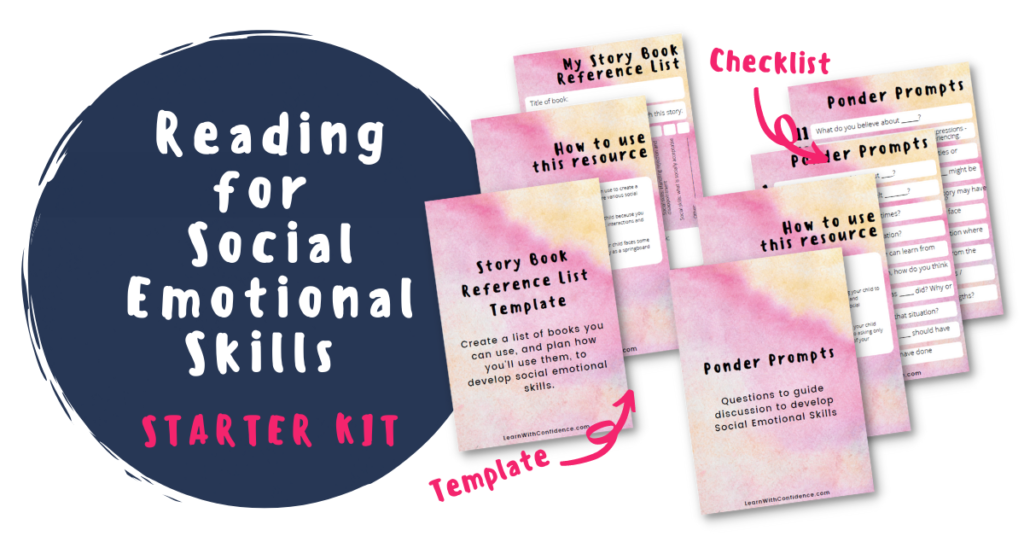
2) Problem solving
Problem solving skills are actually a life skill. I mean, you know how many problems you have to solve on a daily basis. From how you’re going to get the kids from A to B in the afternoon and what you’re having for dinner that evening to major business or work decisions.
Intentionally teaching our children problem solving skills
Our brains are designed to solve problems. But solving them effectively and efficiently is something we can teach our children and have them practice. Developing good problem solving skills starts with the opportunity to experience problems that need solving!
Now that can be tough. Especially for us as moms. Our first inclination is to protect our kiddos from any problems that they may encounter, and when they do, our next step is to swoop in and save the day.
Unfortunately, if we do this all the time, our children will never develop good problem solving skills.
While problem solving starts from when your child is very little. Remember when they figured out the best ways to get your attention, before they could talk, when they needed or wanted something? That was problem solving!
School is a perfect place to learn how to solve problems
School is a perfect place for your child to practice and hone their problem solving skills. From the school work and content, to the classroom setting, from interacting with their friends and peers, to playing sports on the court or field. Your child will encounter a number of opportunities to solve problems.
So when it comes to academic skills and success, problem solving is something your child will use in the content itself (such as answering questions about History work or solving a Maths sum) and in the learning of the content and in all of their interactions in school. And this can boost their success in school and beyond, not to mention their self-esteem.
3) Critical thinking
Critical thinking skills are so important for your child to succeed academically because much of what is required of your child in their work depends on these skills.
Critical thinking skills are all about active learning
Thinking critically involves being able to evaluate and analyze information, questioning things, approaching problems in a systematic way, reflecting on your own ideas, beliefs, solutions and making carefully-considered decisions. People who can think critically don’t accept information at face value, they consider all possible angles.
Does your child question everything? That’s actually a good thing – they’re developing critical thinking skills. (Even when they question you and your authority (cringe*) – because if they can’t do that, they’ll never be able to stand against injustices inflicted by authority figures.) The important thing is to give them an answer. A proper, well-thought-out, well-reasoned answer.
This will not only help your child to understand things better but it will also model for them how to reason and analyze and construct an answer for everything they experience that they need to question.
Gone are the days of “because I say so”. (Well, for the most part – sometimes that answer is what it is and they have to just go with it, right!?)
Critical thinking skills in school
In school, your child will have endless opportunities to use their critical thinking skills. As they answer test questions and research information for projects, as they construct arguments for a debate or prepare a presentation, they will need to do all the things mentioned above. If your child can master this skill they will find the test-taking process a lot easier and be able to confidently give an answer when faced with any question.
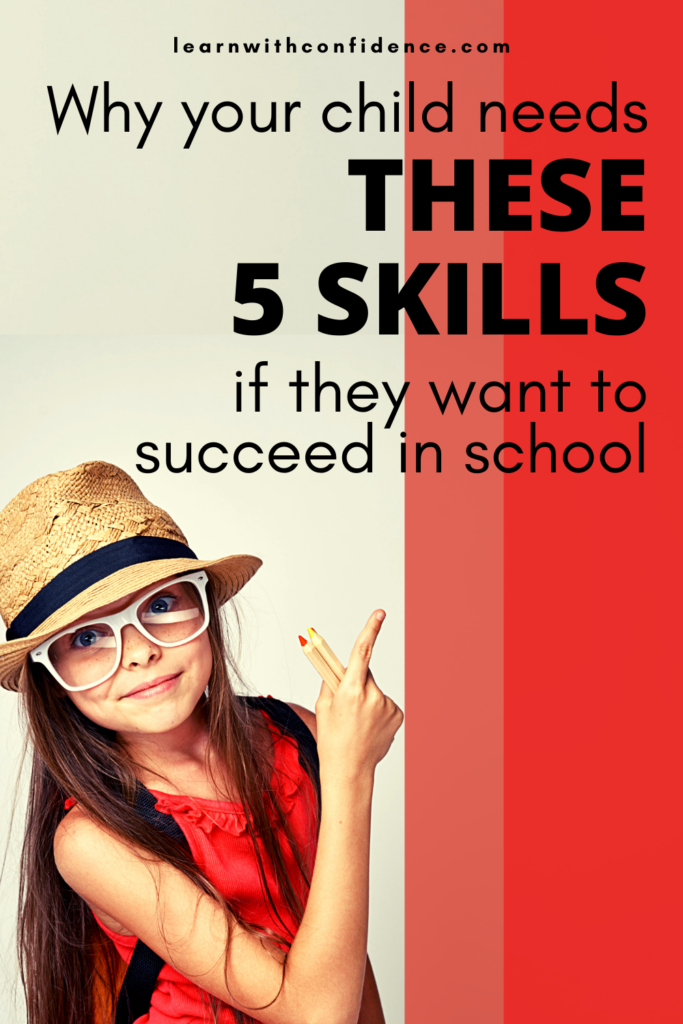
4) Studying skills
Studying for tests and exams and other assessment tasks continues to be a reality in the mainstream education setting. Assessing learning in a quantitative, standardized way (as in tests and exams) continues, so it’s vital that your child learns how to study effectively so they can succeed in this area of their schooling.
What kind of studying skills will my child need?
Studying is essentially how your child inputs and processes information so that later it can be “output” as they answer a question in a test or exam. So studying involves inputting the information, processing it and storing it and then retrieving it for use.
When they study, your child will need to summarize and simplify the content so all the information is condensed down into the most important points. Then it is important to find links between those points (because our brain learns and stores information by making connections). And then finally (which we’ll unpack a bit more in the next section), your child will need to practice retrieving and using that information to prepare effectively for answering questions in a test or exam. (I teach all of this in MUCH more detail in my STUDY SMART Study Skills Course.)
Studying skills to support the way your child’s brain learns best
How a child learns best will differ from child to child because all of us are unique and learn in unique ways. There are a number of ways your child can learn their school work based on how their brain works and what their learning style preference is. If your child is a more visual learner, they may enjoy creating written mind maps. Whereas, a child who is more of an auditory learner may enjoying listening to someone teach them the content, or teach it themselves! And a kinesthetic learner learner enjoys moving around while they learn something in a more practical, physical way. There are a number of study techniques you can explore with your child, to see how they can learn best.
5) Test-taking skills
Because tests remain one of the most popular ways to assess your child’s learning, it’s important not only to teach your child how to study effectively, but also to take that test effectively too!
Mastering test-taking skills is as important as studying for the test.
These are skills your child can learn, practice and master so that when they walk into a test they can:
- Manage any test anxiety they’re experiencing
- Know how to answer different types of questions effectively
- Manage their time so they can finish their tests on time
- Use the mark allocation and other clues to guide them as they complete their test or exam.
Having a test-taking strategy can help your child succeed in their tests and exams.
Often parents tell me that their child studies so hard and still doesn’t achieve the results they so desire. Sometimes that is because they haven’t studied effectively or they haven’t practiced retrieving and using that information (like in doing past papers and practice tests). But sometimes they have a great study strategy, but they crash and burn when it comes to the actual test.
When your child has a test-taking strategy and plan they will feel a lot less anxious walking into a test. And when their brain is in the position to remember and think and reason they can answer their test questions MUCH more effectively!
What can my child do to master these learning skills?
This is the real question right!? Because if they’re struggling, there’s got to be a way to help them improve.
Consider your own thoughts and feelings about learning and success
I’m writing this first, we’re sometimes unaware of how significant our perspective is, as parents.
Your perspective about learning and school and success is beyond important and has a pivotal role in shaping your child’s perspective of these things. As a parent, from the beginning, your child has looked to you to know more about their world. And as they consider their world in school, their potential for learning and success, they’re going to look to you.
Model a growth mindset. Coach them through solving a problem using their critical thinking skills. Show them how enjoyable and important it is to read. Work with them, encouraging them and building them up as they study and take tests. Hold them accountable and teach them the skills they need to manage their time and tasks.
And remember, success is more than a great grade!
Close any gaps by learning the skills they need to
Identify which areas your child might be struggling with. Maybe its in the subject and content itself. Maybe it’s a learning skill they’re lacking. Perhaps they’re struggling on a social or emotional level and need some extra support there.
Find the gap and then it’s time to work on closing it. Help them learn the skills, practice them, master them.
Be aware of opportunities to use these skills
Look for opportunities (or create them) where your child can practice these skills beyond their school work. As your child plays sports, when they’re engaged in their hobbies. Be aware of opportunities for them to practice using these skills.
Maybe it’s in their video game – highlight and enhance their problem solving skills. Or if they’re watching the news on TV and have a question, use it to hone their critical thinking skills. Maybe when they’re reading a book with you at bedtime, throw in a quick question to help them work on their comprehension skills.
Mentorship, tutor, accountability
Sometimes your child needs some extra support and that’s ok. Get your child a tutor to help with a particular subject or with practicing their studying skills. Find someone who can be a mentor and who can inspire them and encourage them as they learn. That extra support and accountability might be exactly what they need to get back on track and start to find school a bit easier and more enjoyable.
Connect with me
Being a mom is tough. And when your kid is struggling in school, it’s even harder!
Feel free to reach out in the comments or send me an email to connect. It’s my mission to equip and empower you to help your child succeed – you are, after all, the best person for that job, because you are the expert on your child.
Save and Share this Post
Pin this image to your favorite board on Pinterest and share it with your momma friends who also want their children to be successful in school.


I would love to connect with you and include you in this community of Mommies as we support each other and grow together to become the best moms we can be!
Get on my emailing list here and I’ll make sure I keep you in the loop on all the latest blog posts, freebies and resources!

